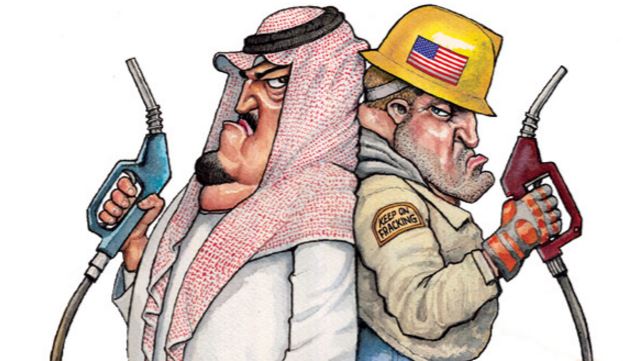The fact OPEC just agreed to agree on nothing in Vienna isn’t particularly surprising given Doha wounds are still festering from the last attempt at ‘petro-diplomacy’. But the engagement ultimately has to been knocked up as a partial success for Saudi Arabia, where it’s managed to put itself back at the centre of cartel politics by thawing the ‘freeze discussion’ on Riyadh’s terms. Confused? Don’t be. As we flagged in OPEC Politics, Doha’s failure left a very dangerous door open for Saudi Arabia, where Russia and Iran could walk through with a Persian led ‘freeze agreement’ at any stage. Iran would become the darling of the cartel helping ‘weaker producers’ out of a bind, despite only producing ‘4mb/d’ compared to KSA’s 10.2mb/d. ‘freeze’ noises Little wonder the new Saudi oil minister, Khalid al Falih starting make ‘freeze’ noises before any other oil minister Gulf Stream jets even hit the Austrian tarmac two days ago. On all counts Riyadhhadto make sure it owned that debate rather than leaving the door ajar for Iran. June therefore had nothing to do with June meetingsper se. This was all about Saudi Arabia getting back in the OPEC game for thenext December 2016 meetings. Once that immediate mission was ‘accomplished’, any tangible freeze discussions duly died today, and with it, any vague notion we’re about to see any serious supply restraint.
Topics:
Eugen von Böhm Bawerk considers the following as important: Bawerk, Crude Oil, Energy, Featured, flood the market, freeze agreement, freeze discussion, Khalid al Falih, newsletter, OPEC, petro-diplomacy, Politics
This could be interesting, too:
Investec writes The Swiss houses that must be demolished
Claudio Grass writes The Case Against Fordism
Nachrichten Ticker - www.finanzen.ch writes Die Performance der Kryptowährungen in KW 9: Das hat sich bei Bitcoin, Ether & Co. getan
Nachrichten Ticker - www.finanzen.ch writes Wer verbirgt sich hinter der Ethereum-Technologie?
‘freeze’ noises
Little wonder the new Saudi oil minister, Khalid al Falih starting make ‘freeze’ noises before any other oil minister Gulf Stream jets even hit the Austrian tarmac two days ago. On all counts Riyadhhadto make sure it owned that debate rather than leaving the door ajar for Iran. June therefore had nothing to do with June meetingsper se. This was all about Saudi Arabia getting back in the OPEC game for thenext December 2016 meetings. Once that immediate mission was ‘accomplished’, any tangible freeze discussions duly died today, and with it, any vague notion we’re about to see any serious supply restraint. This was pure political gaming in Vienna; not getting to grips with physical realities.
Collective output vs. country allocations
From here you’ll hear lots of noise about collective output vs. country allocations.
Both are utter nonsense given any collective ‘target’ would far higher than OPEC abilities to actually meet them, and especially with ‘organic’ supply losses being seen across the distressed player board. Exactly the same dissonance would be seen for ‘country level’ targets. Neither ‘data sets’ will be agreed – in part because Saudi and Iran simply can’t manage to play nice together – but in whole, because OPEC remains a classic ‘last man standing’ volumes game. Beyond Mr. Al Falih’s kind offer not to ‘flood the market’ probably sits a very supply constrained reality where the Kingdom simply doesn’t have the barrels to do so. If they did, you could forget a flood. You’d be looking at a veritable ‘Deluge on the Danube’. Game within a game or not, that underlying fact hasn’t changed in Vienna…

